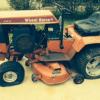
How do I Setup to Drilling Front Axle for Spindle Bushings
By
oliver2-44, in Restorations, Modifications, & Customizations

By
oliver2-44, in Restorations, Modifications, & Customizations